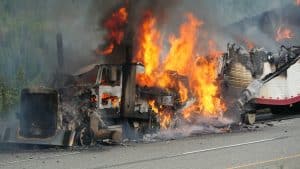A Fiery Semi and a Suspended License Leaves Us with Questions
 North Dakota’s reliance on the trucking industry as a pivotal component of its transportation network makes compliance with federal trucking regulations increasingly critical. When trucking companies don’t follow the rules, people can be seriously hurt.
North Dakota’s reliance on the trucking industry as a pivotal component of its transportation network makes compliance with federal trucking regulations increasingly critical. When trucking companies don’t follow the rules, people can be seriously hurt.
A semi-truck caught fire on Interstate 29 near Christine after its driver-side front steer axle tire blew. The driver, Geral Carlos Sala Romero, managed to safely exit the vehicle before both the truck and trailer, carrying rubber mats, were engulfed in flames. Romero, a 40-year-old from Miami, was cited for driving with a suspended license. The incident led to the closure of portions of southbound I-29, causing traffic detours for several hours at the Christine exit as crews cleared and cleaned the scene.
Now, we’re glad the driver was okay – but we have some questions about why a driver with a suspended license was allowed to be on the roads in the first place.
What screenings are used when hiring drivers?
While we can’t be sure whether the accident in Christine wouldn’t have happened if the driver had a valid license, it demonstrates the importance of regulations like the Federal Motor Carrier Safety Administration’s (FMCSA) rule that “the carrier must request each driver’s MVR [motor vehicle record] every 12 months and must keep the record for 3 years.” The FMCSA not only requires the driver’s motor vehicle record every 12 months, but also that “the carrier must review the motor vehicle records of drivers it employs to determine whether that driver meets minimum requirements for safe driving or is disqualified to drive a CMV [commercial motor vehicle].”
According to backgroundchecks.com, several types of screenings should be done when hiring a truck driver, including:
- Criminal record checks
- Motor vehicle reports from every state where a driver has held a commercial driver’s license (CDL)
- Drug and alcohol screenings to identify hazards, risks, and potential substance abuse
- Medical screening for safe driving clearance to detect conditions that might impair them on the road
- Certification of road safety test passage
- Verification of safe driving for three years with prior employers
Despite these stipulations from the FMCSA some trucking companies may not follow these procedures. When screening isn’t done properly, important details like criminal records, complete driving histories, or issues with drugs and alcohol may be missed.
If a trucking company is found in violation of regulations, they could be fined or forced to close down.
What happens when a truck driver loses their license?
Federal regulations state that a truck driver must inform their employer within one business day if their commercial driver’s license (CDL) is suspended, revoked, canceled, or if they get disqualified from driving. They also need to let their employer know within 30 days if they’re convicted of a traffic violation (except for parking tickets), regardless of what the violation was for or the type of vehicle they were driving. This means the driver should report violations even when driving their own car.
But of course, not all drivers follow the rules. That’s why trucking companies should be monitoring their employees (and contractors) regularly. Remember: the FMCSA only requires a yearly review for licenses. If a company only does the bare minimum, its truckers could be driving around for 11+ months on a suspended or revoked license without anyone knowing. And if that happens, the trucking company can be held to account.
In North Dakota specifically, there’s a Driver’s License Status System which allows you to look up drivers’ licenses by number to see if they’re valid. But trucking companies can also access the FMCSA Commercial Driver’s License Drug and Alcohol Clearinghouse to see if their drivers have any violations. Thanks to a recent update in the rules, any employer who uses the Clearinghouse can now receive an email if one of their employees reports a change in their operating status. Again, it requires drivers to do the right thing, but this new rule is kind of a big deal. Before, employers had to go and manually search; now, they automatically get notified, so there’s no excuse.
Who can be held liable if a trucker causes a wreck?
If you were hit by another car, we’d say that the at-fault driver can be held liable. It’s different with truck accidents because companies are responsible for their drivers. Even if the trucker wasn’t negligent (defective tire treads cause a lot of blowouts), the trucking company might still bear responsibility.
At Larson Law, our team of experienced North Dakota truck accident attorneys thoroughly investigates all crashes to determine liability. We closely examine the training records of the truck driver, ensuring adherence to industry standards and compliance with regulations. We also focus on evaluating the practices of the trucking company regarding providing adequate training. Additionally, we scrutinize potential violations of federal or state regulations governing the trucking industry. Through collaboration with accident reconstruction specialists, witness statements, and surveillance footage, we aim to reconstruct the sequence of events leading to an accident. If you were in an accident with a truck, call us in Minot or complete our contact page to schedule a free consultation. We handle accident cases on a contingency fee basis, meaning we don’t get paid until you do. Larson Law has offices in Fargo, Bismarck, and Minot.

Mark Larson is a Certified Civil Trial Specialist and Certified Civil Pre-Trial Specialist focusing on personal injury, car accidents, wrongful death, and oil field claims. Since 1979, Larson Law has served the injured throughout North Dakota. Read more about Mark V. Larson.
